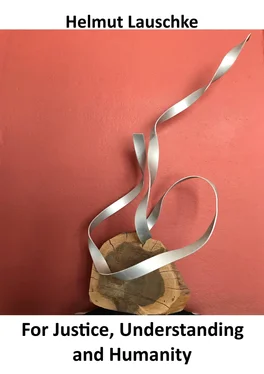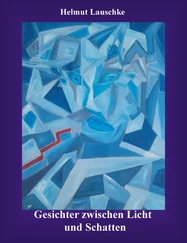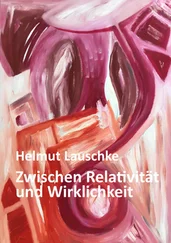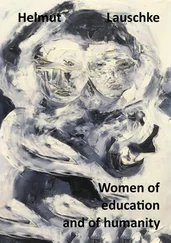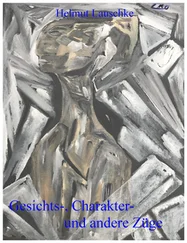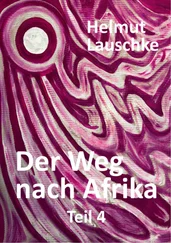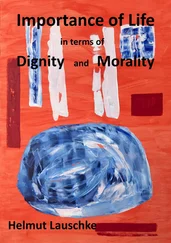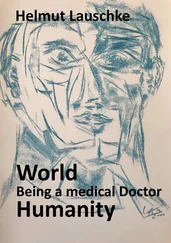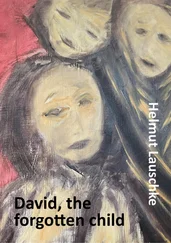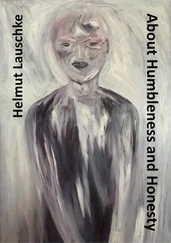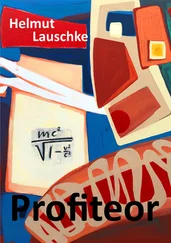Helmut Lauschke
For Justice, Understanding and Humanity
Efforts and the lack of response and support
Dieses ebook wurde erstellt bei

Inhaltsverzeichnis
Titel Helmut Lauschke For Justice, Understanding and Humanity Efforts and the lack of response and support Dieses ebook wurde erstellt bei
Preparations for the future and the withdrawal of the army doctors
The telephone rang on a Saturday morning
Dr Nestor became the first black superintendent in the history of the hospital
Humane psychology versus war psychology
To cut off the girl’s arm
The triangle conversation
The problem of getting milk for the patients. The siren wailed in three waves over the village
The dream of a girl in labour who laid out the torn cloth
The small church bell rang for the Sunday service
Starvation versus rich and regular meals
Before the landing manoeuvre
The transitional period
The helicopter safari over the Kaokoland and the farewell of a great doctor
Power change and the aftermaths
The royal visit
“Attention! Her Majesty The Queen of the United Kingdom”
Willingness, commitment and competence
One who knew and skived
The stage of disrespect and disobedience
The subcommittee’s work for the establishment of a medical faculty at UNAM
Preparation of the international workshop
The missing contribution
How the workshop took place
Visit to the university and to the two hospitals of the Windhoek hospital complex
The outcome of the workshop
There was still something to see
Harlequin with violin without sounding board [as a conclusion]
Impressum neobooks
Preparations for the future and the withdrawal of the army doctors
Efforts and the lack of response and support
Namibia – The Years of Learning and Reconciliation:
Efforts regarding Medical Improvement
With true humbleness, honesty and respect to the disabled and the poor in particular, and hard work in consistency, we shall strive to achieve understanding, reconciliation, trust and truth on a high ethical level which should be the fundament of freedom, peace, uprightness with mutual responsibility and helpfulness, and justice.
Reference:
1) On The Path To Freedom, Macmillan Education Namibia Publishers 2012
2) Dr Omidhi, For Freedom, Equality and Justice, 1 stVolume: Namibia – The Years of Decisions, Life and Medical Challenges, Publisher: Worldwide Books and Art PTY Ltd 2016
3) Namibia – The difficult Years – The most critical time, epubli 2017
A Number of Villagers left Oshakati
The cocks crowed six o’clock when I left the flat for the hospital. I showed the permit to the guard at the checkpoint. Though it was compulsory to check the permit, the guards followed the order often sloppily and did not look on the permit when I was accompanied by the young colleague in uniform as a lieutenant of the SADF. Military vehicles drove frequently out in respect of the fear of the whites regarding the increase of insecurity. These vehicles had driven deep ruts and big potholes into the gravel roads.
Quite a number of villagers had left Oshakati with their families for the south what was Windhoek or one of the coastal towns, or for South Africa to get out of the danger of war and to enjoy the better life with quiet and restful nights and to start some kind of profitable businesses. They preferred to bypass the last rigours of war by joining people who lived without disturbances and fears, and in the prosperity of the white ‘peace’ and to observe the further development of the last, but decisive battle from a distance of the personal safety. The distance did depend on the prosperity they had achieved in the north. The higher the prosperity was with the hidden wealth, the bigger became the distance, but some hundred kilometres in general.
As ‘people from the front’, they held themselves important when they discussed the ongoing war in the north and the consequences with the business people and friends and some drinks what could be expected for the country. They discussed these topics also in length with the stool neighbour at the bar counter what led by the regular repetitions to remarkable and advantageous business deals. Some houses in the village became vacant. The situation was used by the Filipinos who worked as teachers and motor mechanics when they moved from smaller houses into bigger houses which were better maintained and had a bigger garden in the front and in the back.
I passed the hospital gate. The gatekeeper behind the right post was busy with peeling his egg. He threw the shells on the ground and stuffed a big part of the egg into his mouth that he could not reply my morning greeting. Fresh ruts of the Casspirs rough treads with curves were pressed in the sand on the square. Some ruts branched off to the gravelled ring road inside the premises with its huge potholes. I started the round in the intensive care unit. The patient after relaparotomy to stop the intraabdominal bleeder was in a stable condition. The drain produced only little amounts of blood. The blood pressure and pulse rate were reasonable. A bag of blood was connected. I made my notes. The other patients were in stable conditions to be transferred to the general wards. The two bedrooms that the superintendent and doctor for his private patients had occupied were full. In one room were the mothers after their recent deliveries.
I went to the surgical male ward and looked after the old man after the exploratory laparotomy with the inoperable colon cancer. The patient had opened his eyes in which I read the fear of uncertainty and death. The word which should comfort him took the patient without a word. I went from the male ward to the female ward. The old woman after amputation of her left leg due to the malignant bone tumour looked at me without any complaint. She impressed by showing her strong will to recover from the operation that she could leave the hospital as soon as possible to support her daughter in the upbringing of the two small children. ‘High life’ was in the children’s ward. Children who were not bedridden, ran and crawled half or fully naked through the corridor and bedrooms. Some of them had spots of excrements on their grey hospital dresses. There were small urine lakes and piles on the floor what had to be cleared up.
The few nurses did a marvellous work in cleaning the children and replacing the dirty linen by clean linen. They fed them and put them on the bedpan. I admired their commitment and patience. One of these nurses, I called her the angel of the children’s ward, was busy in changing dressings on children with burns. She did it in a professional manner with a mask over her mouth and sterile gloves and made the dressings wet with sterile saline solution before she removed the dressings from the wound. This particular nurse with the true human face was lean and did her work extremely gently to avoid any unnecessary hurt. It were the sick children who were in her mind when she did her work without looking at the small watch on her left wrist. I followed her doing with great attention and respect. It was the close connection between brain and heart what made her work outstandingly valuable. I praised her commitment as a wonder of humanity in this terrible time of war.
It was time for the morning meeting that I left the children’s ward. The office of the superintendent was filled. I took a seat next to Dr Ruth. Dr Nestor came later and took a seat next to US. The matrons and the pharmacist couple sat already on their chairs opposite to the desk of the superintendent and looked straight at his pale face. Dr Lizette and some Philippine doctors arrived and occupied the last empty chairs, Lizette took an upholstered chair at the window front. The superintendent in his white linen jacket left his chair and crossed the room and switched on the air conditioner which started rattling. The short black paediatrician entered the room as the last with the right hand deep in his trouser pocket. He stalked like a star with a face of great importance from the door to the window front and took a seat right of Dr Lizette. He crossed the right leg over the left and looked at the ceiling. Nestor closed the door and the superintendent opened the meeting.
Читать дальше
